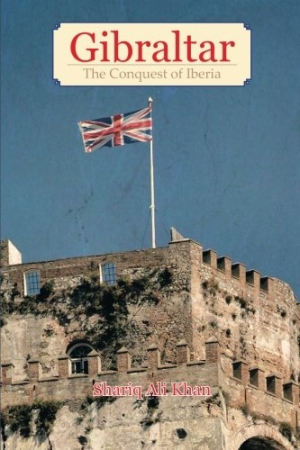Gibraltar
The Conquest of Iberia
Gibraltar is a semihistorical novel with a unique and provocative narrative.
Gibraltar: The Conquest of Iberia is Shariq Ali Khan’s historical, sometimes fantastical, treatment of the Moorish invasion of Spain in the early eighth century. This work often reads as a Muslim contribution to the inspirational fiction genre.
Tariq Ibn Ziyad, at the request of the deposed King Wittiza of Hispania, leads a Muslim army in an invasion to oust Roderick the Terrible, barbarian king of the Visigoths, who has imposed a reign of terror in Spain. Ibn Ziyad’s army lands at Gibraltar and marches steadily onward, easily defeating the Visigoths—sometimes with diplomacy, but in battle when necessary—and converting the heathen and Christian populations. These are what the author calls “polarised” characters, without nuance: Ibn Ziyad wears the white hat and has no flaws; Roderick the Terrible, the Visigoth king deposed by Ibn Ziyad, wears the black hat and is all flaws. However, satisfying character development is provided for the supporting players in this diverse, multiethnic, multireligious cast.
Gibraltar‘s creative narrative is briskly paced and commands attention. Straight facts related to history, geography, and cultural anthropology are enlightening, and theological debates between characters are entertaining. The inclusion of an Umayyad family tree and map of its empire are helpful. Ali Khan places the prologue at the end of the book, explaining that he didn’t want to “scare off any reader who might not be interested in factual history.” It should be moved to the beginning to provide better context for those unfamiliar with the history.
The text makes deft and powerful use of the Qur’an, with characters quoting, extensively and appropriately in context, from the surahs. The historical narrative is intermittently broken to explain a statement, such as one involving skin cancer, vitamin D, and cholesterol, in modern terms, which is distracting. In addition, some of the prose is overdone, as with a saccharine description of the call to prayer.
Believing himself divinely inspired, as Ali Khan says in the foreword, the author embarked on a quest for Muslim role models. He chose Tariq Ibn Ziyad because he “freed [Spain] from tyranny and oppression,” ushering in “perhaps the most fruitful, productive and constructive period of history mankind has ever witnessed.” Gibraltar is the first book in Ali Khan’s planned Andalusian Quintology.
Gibraltar is a semihistorical novel with a unique and provocative narrative, though it tends to preach. It would be appreciated by Muslim reading groups and fans of European and/or Muslim history.
Reviewed by
Michelle Newby
Disclosure: This article is not an endorsement, but a review. The publisher of this book provided free copies of the book and paid a small fee to have their book reviewed by a professional reviewer. Foreword Reviews and Clarion Reviews make no guarantee that the publisher will receive a positive review. Foreword Magazine, Inc. is disclosing this in accordance with the Federal Trade Commission’s 16 CFR, Part 255.

